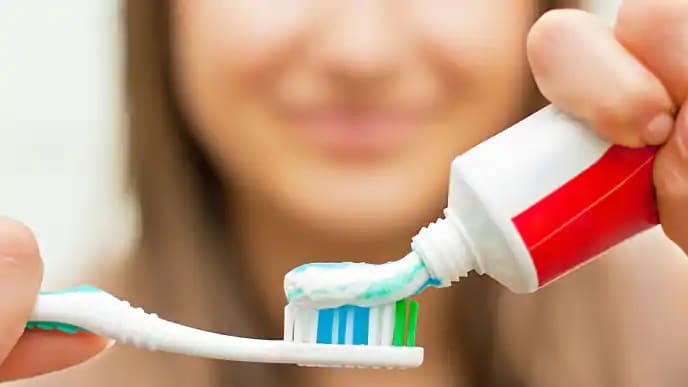-
-

FLUORIDE
What Is Stannous Fluoride Toothpaste?Discover what is Stannous Fluoride Toothpaste and its importance to prevent cavities and other oral health problems.

TEETH WHITENING
Whitening toothpaste - hydrogen peroxide vs. carbamide peroxideIf you lose one or more of your front teeth due to injury or decay, you may feel ...
-
Science & InnovationOral Health Commitment
- Oral Health Commitment
- Bright Smiles, Bright Futures
- Educational Resources
- Mobile Dental Van
- Volunteer
- ORAL HEALTH CHECK
- PRODUCT MATCH
- Oral Health and Dental Care | Colgate®
- Oral Health
- Is Dental Floss Eco-Friendly?


Daily interdental cleaning is essential for a healthy mouth, but what impact does single-use floss have on the environment? If you’re looking for more eco-friendly products to introduce to your healthcare routines, there are a few alternatives to the floss you’re probably used to that still allow you to practice good oral health.
Why Flossing Is Important
Interdental cleaning promotes gum health by preventing dental biofilm—or plaque—from building up between your teeth. Dental floss, floss picks, and water flossers can reach areas your toothbrush can’t—lowering your risk of developing tooth decay and gum diseases such as gingivitis.
What Is Dental Floss Made Of?
Dental floss is typically made from synthetic waxed nylon or Teflon. The mixed materials used in traditional floss make recycling too difficult–some research suggests it can take 80 years to break down in a landfill. Plastic dental floss picks are also made of mixed materials that are too small to recycle.
Can Dental Floss Be Reused?
The American Dental Association does not recommend reusing dental floss. Multiple uses of nylon floss can cause it to fray and transfer bacteria and food particles to your mouth.
Eco-friendly Dental Floss Alternatives
There are plenty of environmentally conscious alternatives you can purchase without sacrificing your oral health. Companies have developed recyclable toothpaste tubes and programs that recycle dental floss containers. Cardboard and other biodegradable materials are also becoming more commonly used in dental floss containers.
Some eco-friendly interdental floss options include:
- Silk floss
- All-natural dental floss made from plants and bees’ wax
- Bamboo floss made with charcoal-infused polyester
- Reusable floss picks made from recycled paper
- Water flossers
Making the transition to zero waste isn’t easy. Just know, there are green alternatives out there and small actions you can take to lessen your carbon footprint on the planet.
Oral Care Center articles are reviewed by an oral health medical professional. This information is for educational purposes only. This content is not intended to be a substitute for professional medical advice, diagnosis or treatment. Always seek the advice of your dentist, physician or other qualified healthcare provider.
Related Articles

Brushing and flossing
Waxed or Unwaxed Dental Floss? Assessing Your Oral Health NeedsWaxed and unwaxed dental floss are two of the most common types, and they both have their merits. Here's how they differ and how to know which to use.

Brushing and flossing
From Battle to Bonding: Making Brushing Fun for Your KidsBy: Mandy Dennis
Registered Dental Hygienist

Brushing and flossing
Replace Your Toothbrush Head Already!Find out when you need to replace your toothbrush head and the importance of a fresh brush head to your oral health.

Brushing and flossing
What Are Microbeads In Toothpaste?Learn more about microbeads in toothpaste and how the recent ban is good news for your health and the environment. Also learn about alternatives.
Related Products

Colgate Total Active Prevention Whitening Toothbrush is a soft toothbrush with charcoal infused spiral and Floss-Tip bristles (1). This soft bristle toothbrush fights the root cause* of cavities, plaque, gingivitis, bad breath, tartar buildup**, and stains*** and also helps remove surface stains to prevent stain buildup.

Power away plaque with Colgate Total Battery Powered Toothbrush. This battery operated toothbrush for adults fights the root cause* of cavities, plaque, gingivitis, bad breath, tartar buildup**, and stains***. Plus, this battery toothbrush has a built in 2 minute timer and features two cleaning modes, Sensitive and Regular, to cater to your unique oral care needs.

The Colgate Total® Active Prevention Foaming Clean Soft Bristle Toothbrush is specially designed to tackle the root cause* of cavities, plaque, gingivitis, bad breath, tartar buildup**, and stains***.

Colgate Total Alcohol Free* Gum Health Mouthwash delivers 24-hour protection** against bacteria and also helps prevent gum problems

Helping dental professionals
More professionals across the world trust Colgate. Find resources, products, and information to give your patients a healthier future




